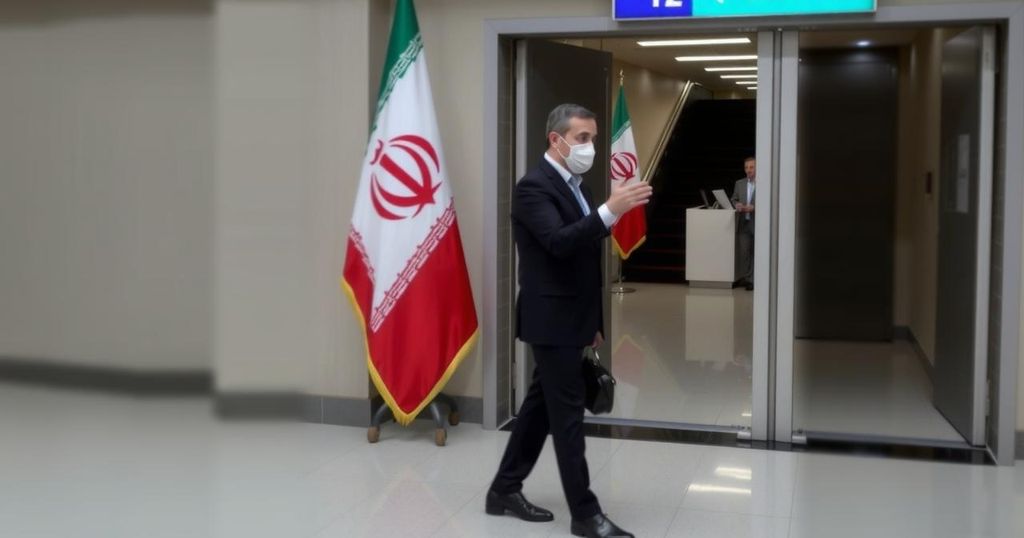Lebanon’s Foreign Ministry confirmed funds carried by an Iranian diplomat at Beirut Airport were for embassy use after he resisted a search. The standoff prompted reactions from Hezbollah supporters and highlighted ongoing concerns about Iranian influence and financial flows to Hezbollah amid increasing scrutiny from Lebanese and international authorities.
Recent developments at Beirut Airport have highlighted tensions regarding the transportation of funds by Iranian diplomats. Following an incident where an Iranian diplomat resisted having his luggage searched, the Lebanese Foreign Ministry later confirmed that the cash and documents in his possession were allocated for embassy operations. The Ministry reiterated its compliance with the Vienna Convention on Diplomatic Relations, allowing entry of the diplomat’s bags after receiving a clarification note from the Iranian Embassy, which emphasized the legitimate purpose of the contents.
The airport standoff drew attention as Lebanese security officials sought to inspect the diplomat’s luggage, prompting protests from supporters of Hezbollah. Following the incident, there was a notable increase in the presence of motorcycle-riding Shia youths aligned with Hezbollah in the vicinity, which led to the Lebanese Army taking precautions to block off certain areas around the airport. This incident marks another event in a series of diplomatic frictions concerning funds linked to Iranian support for Hezbollah amidst Lebanon’s ongoing complex political landscape.
Iran’s military and political influence in Lebanon has been under scrutiny recently, particularly as the Lebanese government appears to take a firmer stance amid international pressure from the United States and Israel. These authorities had already imposed warnings regarding the inspection of Iranian flights, and any identified cash transfers deemed suspicious would be subject to government seizure. Iran has reportedly been attempting to send significant sums of money to Hezbollah via Mahan Air, underlining the ongoing financial support for the group.
Furthermore, Hezbollah officials have stated that financial assistance has been provided to displaced Lebanese households, allegedly funded by Iran. Naim Qassem, the Deputy Secretary-General of Hezbollah, noted that considerable amounts had been disbursed to support families impacted by the ongoing crisis, tying these efforts back to Iranian financial resources. Historical accounts have illustrated an established pattern of cash transfers to Iranian proxy groups, emphasizing the enduring ties between Iran and its regional affiliates.
In summary, the incident at Beirut Airport not only reflects the complexities of diplomatic relations but also raises questions about the commitment of Lebanese authorities to control Iranian support for Hezbollah. The responses from the Lebanese government may indicate both an effort to comply with international standards and a potential re-evaluation of its own domestic political dynamics regarding external influences. As these developments unfold, they will significantly impact the broader geopolitical landscape in the region.
The relationship between Iran and Hezbollah has long been entwined with financial and military support, which has raised concerns among other nations in the region and globally. Lebanon finds itself in a precarious situation, balancing internal pressures from Hezbollah, which has significant support among the Shia population, and external pressures from Western countries aiming to limit Iran’s influence. The Vienna Convention on Diplomatic Relations serves as a framework to protect embassy activities, often complicating efforts to scrutinize the financial interactions involving diplomats. The underlying tensions at the airport incident illuminate the broader issues of accountability and sovereignty within Lebanese governance.
The incident involving the Iranian diplomat at Beirut Airport underscores ongoing tensions between Iran, Hezbollah, and the Lebanese authorities. As Lebanon navigates the complexities of its internal and external political relationships, the handling of Iranian funds signifies its precarious balancing act amid international scrutiny. The context surrounding this incident reflects a pressing need for Lebanon to assert its sovereignty while contending with powerful foreign influence, primarily from Iran.
Original Source: www.iranintl.com






